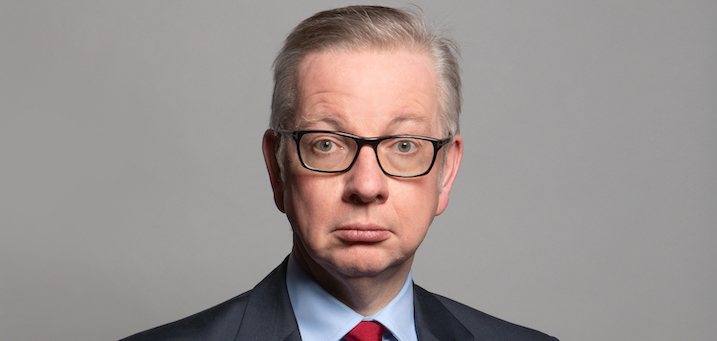A 6.5% increase in funding in the provisional local government settlement for 2024/25 has been announced.
The package presented to parliament by Michael Gove, secretary of state for levelling up, housing and communities, is worth more than £64bn and represents an almost £4bn increase in core spending power over 2023/24.
Of this, some £2bn is additional government funding while £1bn is for children’s and adult social care in 2024-25. This year, councils received a 9.4% increase in funding.
But while Gove said the settlement “demonstrates how the government stands behind councils up and down the country”, he also told local authorities to “consider, where possible, the use of their reserves to maintain services in the face of [pressures]”.
He stated that the government noted that whilst local authority reserves are falling, they remain “significantly higher” than prior to the pandemic.

Gove argued that the provisional settlement “ensured stability” and maintained the Funding Guarantee introduced last year, with every council seeing at least a 3% increase in Core Spending Power next year before any local decisions on council tax rates.
Gove said he was also “uplifting core Settlement funding, with the Revenue Support Grant increasing by CPI, and local authorities seeing an increase in baseline funding levels (BFLs) and compensation grant as if both business rating multipliers had increased by CPI”.
This represents a continuation of the approach set out at last year’s settlement for other grants such as the Rural Services Delivery Grant and New Homes Bonus.
The “most relatively deprived areas of England” will receive 18% more per dwelling in available resource through the settlement than the least deprived areas.
Gove also said he would extend the flexibility to use capital receipts to fund revenue costs of projects “that reduce costs and improve efficiency” to March 2030. “We will engage with the sector to explore additional capital flexibility options to enable invest-to-save and transformation initiatives,” he promised.
The secretary of state noted that the Exceptional Financial Support framework is available “to provide support where a council has a specific and evidenced concern about its ability to set or maintain a balanced budget, including where there has been local financial failure”.
He added: “Where councils need additional support from the government, they should take every possible step to minimise the need for that support to be funded by national taxpayers, while also recognising the cost-of-living pressures on families. As part of that process, the government will consider representations from councils, including on council tax provision.”
The government view continues to be that councils in the most severe financial failure, that are seeking multi-year support from government, “should continue to take all reasonable local steps to support recovery including additional council tax increases”, he noted.
In the case of Thurrock, Slough and Woking councils, the government is proposing that bespoke council tax referendum principles should apply for the 2024-25 settlement. For Thurrock and Slough that means a core council tax referendum threshold of 8%, and 10% for Woking.
“Councils in significant financial failure can make use of any additional flexibilities provided to support their financial recovery and going forward the government will consider all reasonable steps to protect both national and local taxpayers and ensure councils are acting responsibly,” Gove said.
Finally, Gove reiterated the government’s position on four-day working weeks. “We have included in the consultation our proposals to use financial levers within the settlement to disincentivise councils from operating part time work for full time pay in future settlements,” Gove said. “Those councils which are considering or operating such arrangements should not start this practice or stop it immediately.”
A consultation on the proposals has been launched and will run until 15 January.
Crisis-cash-repeat
The Local Government Association (LGA) warned that the settlement “does not provide enough funding to meet the severe cost and demand pressures which have left councils of all political colours and types warning of the serious challenges they face to set balanced budgets next year.”
Shaun Davies, chair of the LGA, said: “The funding uplift announced by the government assumes that all councils will increase their council tax bills by the maximum allowed in 2024/25. This means councils are again left facing the difficult choice about raising bills to bring in desperately needed funding.
“Councils in England continue to face a funding gap of £4bn over the next two years as today’s announcement does not change the funding gap facing councils this year and next.
“It is therefore unthinkable that government has not provided desperately needed new funding for local services in 2024/25. Although councils are working hard to reduce costs where possible, this means the local services our communities rely on every day are now exposed to further cuts.”
Davies said no council was now immune to the “growing” risk of financial sustainability. “The government urgently needs to address the growing financial crisis facing councils and come up with a long-term plan to sufficiently fund local services through multi-year settlements,” he said.
Similarly, the Chartered Institute of Public Finance and Accountancy (CIPFA) said the provisional local government settlement for 2024/25 “fails to ease” the long-term funding crisis for local councils in England.
While the “in line with inflation” increase and additional 3% minimum core spending power increase is welcome, CIPFA said, “funding remains insufficient to meet councils’ significant and growing needs”.
Rob Whiteman, CIPFA CEO, said the provisional settlement did not provide a ”much-needed lifeline” while “many local authorities risk drowning in a sea of rising demand and inflationary costs”.
“Following the Autumn Statement, it is disappointing that this well-worn cycle of ‘crisis-cash-repeat’ funding remains,” he said. “The funding settlement hides the complexity of a fundamentally flawed system. Much of this new money will be consumed by the increased national minimum wage and rising temporary accommodation costs. The settlement fails to significantly address the long-term funding crisis faced by councils.”
Indeed, CIPFA said that increasing the overall funding to local authorities hides the assumption that council tax will be raised. In addition, one-off settlements do not take into account business rates rises by the Consumer Price Index (CPI) for councils nor the stagnant social care Better Care Fund, which remains the same as 2022/23, the organisation noted.
Funding of £100m for families on low income to ease council tax increases was welcomed, but CIPFA said the announced £2bn for social care is “not new”.

Not enough
London Councils said the 6.4% funding boost would not be enough for London local authorities to “address all the skyrocketing costs and financial distress boroughs are experiencing”. The cross-party group anticipates a continuing funding shortfall of at least £500m “with worrying consequences for local services across the capital”.
Claire Holland, acting chair of London Councils, said: “We are deeply concerned 2024 looks set to be another year of massive budget pressures and a continuing squeeze on Londoners’ local services.
“The measures announced by the government fall short of what we need. Much of this uplift also relies on council tax rises, which will be extremely difficult for Londoners struggling with the cost of living.
“The entire system of local government funding needs urgent reform. For too long, boroughs in the capital have been left with inadequate resources despite London’s population and demand for services growing fast.”
The County Councils Network (CCN), which represents England’s largest councils, said county authorities would be “bitterly disappointed” by the announcement.
Councils would be left with “no choice but to implement more severe reductions to services and to levy higher council tax rises”, while “an increasing number of local authorities will struggle to deliver a balanced budget next year”.
Barry Lewis, finance spokesperson and vice-chairman of the CCN said: “The CCN had put together a strong case for emergency funding next year to address the significant financial headwinds councils face which are outside of our control. But despite constructive discussions with ministers over recent days the government has chosen not to act.
“We know that government finances are tight, but there is a value in investing in public services, so we will now be making our case to county MPs ahead of the parliamentary vote on the final local government settlement to ensure that they are aware of the extent to which highly valued local services will have to be cut next year unless further funding is provided.”
No Christmas spirit
Solace, the membership network for public sector and local government professionals, said the content of the settlement was even less welcome than the timing of it, in the last week before Christmas.
Patrick Melia, Solace spokesperson for finance, commented: “Without a genuinely sustainable financial settlement for the sector, it won’t be long before a stream of well-managed authorities start to tip over the edge.
“The bare fact is there are very few savings options left. And the cuts that councils are now making to their services in order to remain financially sustainable are only storing up trouble for years ahead – reducing quality of life for our residents in the here and now, but also leading to increasingly complex social problems that cost the public purse much more in the long-run. Even worse, the chronic underfunding of our services and our areas will negatively impact our national economic prospects at a time when an upswing in productivity and growth is much needed.”
Melia called for a longer-term approach, and a minimum three-year financial settlement. This would “allow for more effective planning” but “must also close the persistent and growing funding gaps in both adult and children’s social care and provide additional funding to cover the cost of inflation and higher than expected pay awards for council workforces. Anything less and the cost for the country in years to come will be even higher.”
—————
FREE weekly newsletters
Subscribe to Room151 Newsletters
Follow us on LinkedIn
Follow us here
Monthly Online Treasury Briefing
Sign up here with a .gov.uk email address
Room151 Webinars
Visit the Room151 channel













